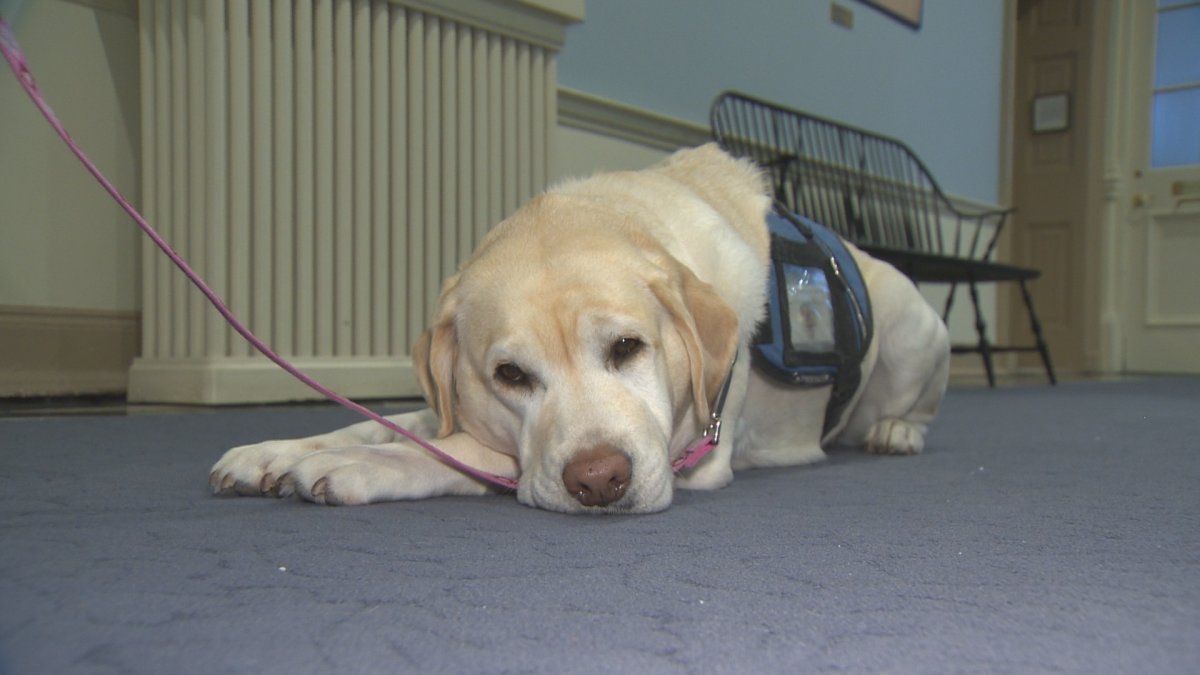Nova Scotia veterans, politicians and members of the public advocating for recognition of PTSD and other psychiatric service dogs are calling on the federal government to allow for the animals to be covered under the Medical Expense Tax Credit (METC).

READ MORE: Service dogs to have more recognition and acceptance in Nova Scotia
Veterans, many of whom were accompanied by service dogs, as well as politicians and the public gathered at Province House on Thursday to raise awareness and call on the government to recognize how the service dogs help people medically.
Retired captain Medric Cousineau of the Royal Canadian Air Force and founder of Paws Fur Thought – which helps veterans get qualified psychiatric service dogs – said service dogs can be used by people with various needs — but not everyone recognizes that.
According to Paws fur Thought’s website, service dogs are therapy dogs to be used “in conjunction with traditional therapies” like medication and counselling. The Mental Health Foundation also says on its website the dogs are trained to “sense and react to their partner’s triggers and physiology.” The foundation says the dogs help their partners by preventing anxiety attacks, diverting attention and providing other coping mechanisms.
READ MORE: N.S. Mental Health Foundation gives 1st service dog to PTSD sufferer
Cousineau told Global News having a service animal can have a big impact on a person’s life, but for those with PTSD like himself, it can be a different story.
- Posters promoting ‘Steal From Loblaws Day’ are circulating. How did we get here?
- Video shows Ontario police sharing Trudeau’s location with protester, investigation launched
- Canadian food banks are on the brink: ‘This is not a sustainable situation’
- Solar eclipse eye damage: More than 160 cases reported in Ontario, Quebec
“What they don’t see is these dogs are our lifeline, they are our medical appliance, they are our wheelchairs for our minds for want of a better word,” Cousineau said.
He said adding psychiatric service dogs into the tax code could allow veterans and other owners of these dogs, such as first responders, to save a few hundred dollars a year.
Currently animals listed as eligible under the tax credit, according to the Canada Revenue Agency, are those assigned to people who are blind, “profoundly deaf,” severely affected by autism or epilepsy, have severe diabetes or have a severe or prolonged impairment restricting the use of their arms or legs.
But Cousineau said those who qualify for or hold a Disablity Tax Credit – required to apply for the METC – can’t get the medical tax credit because they and their service animal do not fall under those eligibility requirements.
He said he has been in touch with several members of the federal government including Finance Minister Bill Morneau and Veterans Affairs Minister Kent Hehr, but feels not enough is being done.
READ MORE: New program will train PTSD service dogs
Morneau’s press secretary, Annie Donolo, said in a statement Friday to Global News that the government reviews and expands the list of eligible expenses on an ongoing basis. She also wrote that the Department of Veterans Affairs launched a “pilot study” to look into whether psychiatric service dogs are a “safe and effective treatment for post-traumatic stress disorder” and is also seeking to establish national standards to “provide assurance” service dogs meet proper training and behaviour standards.
“Finance Canada looks forward to receiving the results of these projects,” Donolo wrote. “They will provide important evidence as the department considers whether the list of eligible expenses should be expanded to include psychiatric service dogs.”
But Cousineau said the government isn’t moving fast enough.
“It is a one-line fix,” Cousineau said. “We are not asking you to reinvent fire, the wheel, or split the atom, all we’re asking them for is to do what’s right.”
Former Sackville-Eastern Shore NDP MP Peter Stoffer said studies have taken place before.
“You don’t treat an injury with delay, you treat an injury with speed and efficiency,” Stoffer said.
Cousineau, Stoffer, and Canadian veteran Sgt. Stuart Rodgers, were also joined by Nova Scotia Progressive Conservative Leader Jamie Baillie and N.S. NDP house leader Dave Wilson who both pushed for change.
Baillie, whose party introduced the Psychiatric Service Dogs Tax Credit Act in the legislature in April, said trying to persuade the federal government to make the change nationally has caused frustration.
“We’re trying to fix an injustice,” Baillie told Global News. “People with PTSD and mental illness deserve equal treatment to people with physical illness under our tax code and the government in Ottawa, even the Liberal government here provincially, they have the power to make that happen.”
Wilson said Ottawa needs “not to discriminate” against those with mental illness who have service dogs – which can include veterans and first responders – and the issue is something all political parties should look at.
A letter from the Royal Canadian Legion’s dominion president David Flannigan also called on the government to “take immediate action” and consider “the addition of mental illness” to the tax credit.




Comments